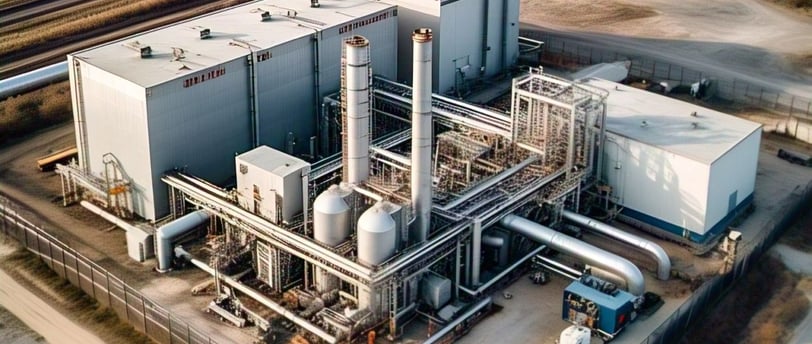Rajasthan Unveils New CBG Policy to Boost Clean Energy and Biofuel Production
Rajasthan has launched a CBG policy under its clean energy initiative to boost bio-energy projects and biofuel usage. This aims to attract investments and promote biofuels in transportation and domestic sectors.
CBG POLICY
Rajendra Kumar
3/4/20254 min read


Rajasthan Unveils New CBG Policy to Boost Clean Energy and Biofuel Production
In a significant move towards clean energy and sustainable development, the Rajasthan government has introduced a dedicated policy for Compressed Biogas (CBG) as part of the broader Rajasthan Integrated Clean Energy Policy, 2024. The initiative aims to promote bio-energy projects, drive investments, and encourage the use of biofuels in transportation and domestic sectors.
Key Highlights of the Rajasthan CBG Policy
1. Promotion of CBG Projects
The state government will actively support the Ministry of New and Renewable Energy’s (MNRE) biogas program. The focus will be on power generation and blending Compressed Biogas (CBG) with Compressed Natural Gas (CNG) to cater to transport and domestic needs. Rajasthan aims to establish a network of CBG/Bio-CNG plants, positioning itself as a leader in bio-energy production.
2. Registration of CBG Projects
Developers who have already received Letters of Intent (LOI) under the SATAT (Sustainable Alternative Towards Affordable Transportation) scheme and other bio-energy initiatives will be registered under this new policy framework. This ensures a streamlined approach to project implementation and regulatory compliance.
3. Separate Guidelines for Implementation
The Energy Department of Rajasthan will release detailed guidelines for the execution and promotion of CBG/Bio-CNG projects. These guidelines will outline technical, financial, and operational requirements to ensure the efficient execution of bio-energy projects in the state.
4. Land Allotment for CBG Plants
To facilitate project development, the Rajasthan government has outlined specific provisions for land allotment:
Up to 10 acres of land will be allocated for a CBG plant with a capacity of 10 Metric Tons Per Day (MTPD).
An additional 25 acres of land will be allotted for feedstock storage.
Developers must deposit a security amount of Rs. 1 Lac per MTPD through DD/NEFT/RTGS in favor of the Rajasthan Renewable Energy Corporation (RREC).
The security deposit will be refunded upon successful commissioning of the project. However, failure to utilize the allotted land within the prescribed timeline will result in forfeiture of the security deposit.
5. Incentives and Benefits
CBG projects in Rajasthan will be eligible for incentives under the Rajasthan Investment Promotion Scheme (RIPS-2024), which offers various financial and regulatory benefits to promote bio-energy investments.
A) Financial Incentives for CBG Projects
Electricity Duty Exemption: a) 100% exemption for 7 years for captive use.
Stamp Duty Exemption & Reimbursement of stamp duty: a) 75% exemption on stamp duty b) 25% reimbursement of stamp duty.
Land Conversion Charges: a) 75% exemption on land conversion charges. b) 25% reimbursement on land conversion charges.
Mandi Fee / Market Fee: a) 100% reimbursement for 7 years on agricultural raw materials used for CBG production.
Pollution Control Board Fees: a) Exemption from fees for obtaining: ➤ Consent to Establish (CTE) ➤ Consent to Operate (CTO)
SGST (State Goods & Services Tax) Benefits: a) Investment-linked SGST reimbursement as per RIPS guidelines.
B) Incentives for Captive Power & Open Access CBG Plants
Transmission & Wheeling Charges: a) 100% exemption on transmission & wheeling charges for captive use. b) Full banking facility with no restriction on withdrawals during peak hours.
Behind-the-Meter RE Plants: a) No ceiling on CBG plant capacity for captive use. b) Electricity Duty exemption in perpetuity, provided no power is injected into the grid.
Third-Party & Open Access Sale: a) CBG producers selling power to third parties can avail Open Access benefits.
EV Charging Stations Incentive: a) If a CBG plant supplies bio-CNG to EV charging stations, it qualifies for additional RIPS benefits.
C) Land & Infrastructure Incentives for CBG Projects
Priority Land Allotment: a) Government land can be allotted at concessional rates. b) Private land can be acquired without conversion under the Rajasthan Tenancy Act, 1955.
Water Supply Concessions: a) The Water Resources Department will allocate water from IGNP (Indira Gandhi Nahar Project) or other sources. b) Any modifications in canal infrastructure will be funded by the developer but facilitated by the government.
Stamp Duty & Land Lease Incentives: a) 75% stamp duty exemption for lease/development of land for CBG plants.
D) Additional Support for Large CBG Projects
1. Anchor Enterprises & Large-Scale Investments: Large-scale CBG manufacturing projects may be eligible for:
➤ Higher SGST reimbursements.
➤Long-term tax holidays.
➤ Extended exemptions under RIPS.
Green Hydrogen & Biofuels Incentives: If a CBG plant integrates Green Hydrogen production, it qualifies for additional subsidies.
Waste-to-Energy & Circular Economy Projects: If the CBG plant is part of a municipal waste-to-energy initiative, it may receive additional grants.
Central Financial Assistance (CFA) for CBG Projects
CBG projects will also be eligible for Central Financial Assistance (CFA) under various Ministry of New and Renewable Energy (MNRE) schemes. Key financial incentives include:
Capital Subsidy: ₹4 crore per 4800 kg/day of CBG production capacity.
Interest Subvention: Up to 2% interest rebate on loans for eligible developers.
Performance-Based Incentives: ₹0.50 per kg of CBG produced for three years to encourage sustained production.
Bio-Manure Assistance: ₹1 crore per 4500 tonnes per annum of bio-manure production.
Fiscal Incentives & Tax Benefits: GST concessions, accelerated depreciation benefits, and tax deductions.
Infrastructure Support: Funding for pipeline connectivity up to 2 km from the plant.
Market Development Assistance: Guaranteed off-take agreements under the SATAT initiative.
The launch of this policy marks a significant step toward energy sustainability and waste-to-energy conversion. By leveraging its abundant biomass resources, Rajasthan aims to reduce dependence on fossil fuels, cut down carbon emissions, and create new employment opportunities in the green energy sector.
As the state gears up to implement this ambitious policy, stakeholders from the renewable energy sector, investors, and entrepreneurs are expected to play a crucial role in shaping Rajasthan’s clean energy landscape.
Stay tuned for more updates on Rajasthan’s clean energy initiatives!
Geosprings Technologies Pvt Ltd
We Build Sustainable Eco System
Innovation
Partnerships
info@geosprings.in
+91-141-6657149
+91-9116434786,7300247048
© 2025. All rights reserved.
411, City Mall, C Scheme, Bhagwan Das Road, Jaipur, Rajasthan
